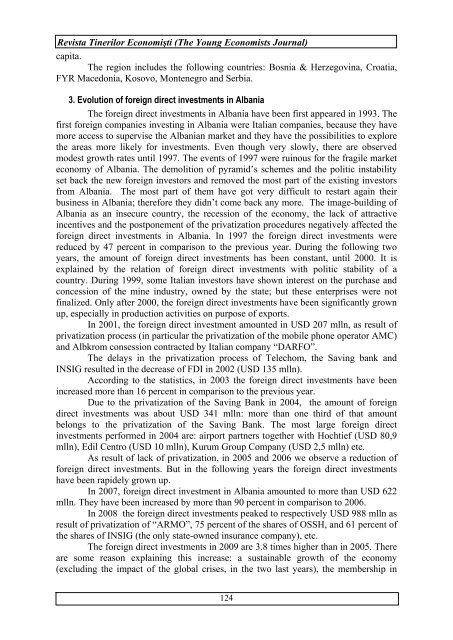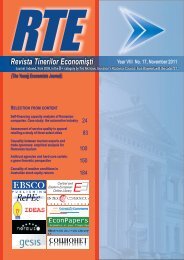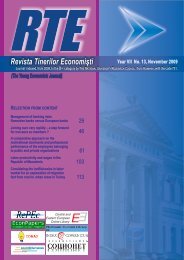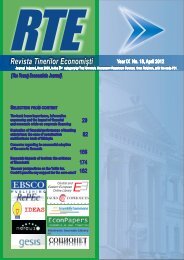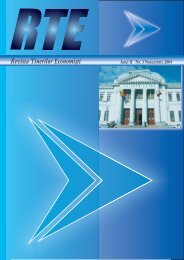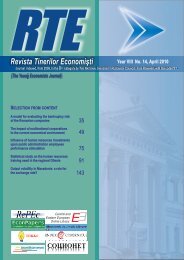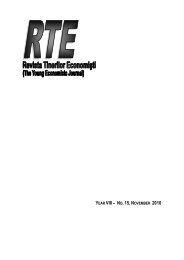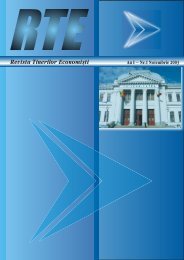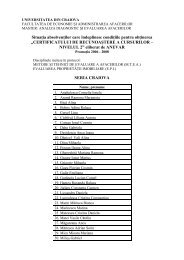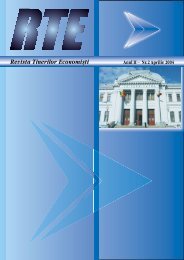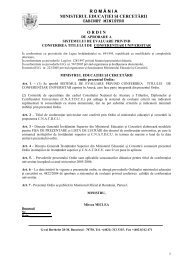Revista Tinerilor Economiºti (The Young Economists Journal)
Revista Tinerilor Economiºti (The Young Economists Journal)
Revista Tinerilor Economiºti (The Young Economists Journal)
You also want an ePaper? Increase the reach of your titles
YUMPU automatically turns print PDFs into web optimized ePapers that Google loves.
<strong>Revista</strong> <strong>Tinerilor</strong> Economişti (<strong>The</strong> <strong>Young</strong> <strong>Economists</strong> <strong>Journal</strong>)<br />
capita.<br />
<strong>The</strong> region includes the following countries: Bosnia & Herzegovina, Croatia,<br />
FYR Macedonia, Kosovo, Montenegro and Serbia.<br />
3. Evolution of foreign direct investments in Albania<br />
<strong>The</strong> foreign direct investments in Albania have been first appeared in 1993. <strong>The</strong><br />
first foreign companies investing in Albania were Italian companies, because they have<br />
more access to supervise the Albanian market and they have the possibilities to explore<br />
the areas more likely for investments. Even though very slowly, there are observed<br />
modest growth rates until 1997. <strong>The</strong> events of 1997 were ruinous for the fragile market<br />
economy of Albania. <strong>The</strong> demolition of pyramid’s schemes and the politic instability<br />
set back the new foreign investors and removed the most part of the existing investors<br />
from Albania. <strong>The</strong> most part of them have got very difficult to restart again their<br />
business in Albania; therefore they didn’t come back any more. <strong>The</strong> image-building of<br />
Albania as an insecure country, the recession of the economy, the lack of attractive<br />
incentives and the postponement of the privatization procedures negatively affected the<br />
foreign direct investments in Albania. In 1997 the foreign direct investments were<br />
reduced by 47 percent in comparison to the previous year. During the following two<br />
years, the amount of foreign direct investments has been constant, until 2000. It is<br />
explained by the relation of foreign direct investments with politic stability of a<br />
country. During 1999, some Italian investors have shown interest on the purchase and<br />
concession of the mine industry, owned by the state; but these enterprises were not<br />
finalized. Only after 2000, the foreign direct investments have been significantly grown<br />
up, especially in production activities on purpose of exports.<br />
In 2001, the foreign direct investment amounted in USD 207 mlln, as result of<br />
privatization process (in particular the privatization of the mobile phone operator AMC)<br />
and Albkrom consession contracted by Italian company “DARFO”.<br />
<strong>The</strong> delays in the privatization process of Telechom, the Saving bank and<br />
INSIG resulted in the decrease of FDI in 2002 (USD 135 mlln).<br />
According to the statistics, in 2003 the foreign direct investments have been<br />
increased more than 16 percent in comparison to the previous year.<br />
Due to the privatization of the Saving Bank in 2004, the amount of foreign<br />
direct investments was about USD 341 mlln: more than one third of that amount<br />
belongs to the privatization of the Saving Bank. <strong>The</strong> most large foreign direct<br />
investments performed in 2004 are: airport partners together with Hochtief (USD 80,9<br />
mlln), Edil Centro (USD 10 mlln), Kurum Group Company (USD 2,5 mlln) etc.<br />
As result of lack of privatization, in 2005 and 2006 we observe a reduction of<br />
foreign direct investments. But in the following years the foreign direct investments<br />
have been rapidely grown up.<br />
In 2007, foreign direct investment in Albania amounted to more than USD 622<br />
mlln. <strong>The</strong>y have been increased by more than 90 percent in comparison to 2006.<br />
In 2008 the foreign direct investments peaked to respectively USD 988 mlln as<br />
result of privatization of “ARMO”, 75 percent of the shares of OSSH, and 61 percent of<br />
the shares of INSIG (the only state-owned insurance company), etc.<br />
<strong>The</strong> foreign direct investments in 2009 are 3.8 times higher than in 2005. <strong>The</strong>re<br />
are some reason explaining this increase: a sustainable growth of the economy<br />
(excluding the impact of the global crises, in the two last years), the membership in<br />
124


